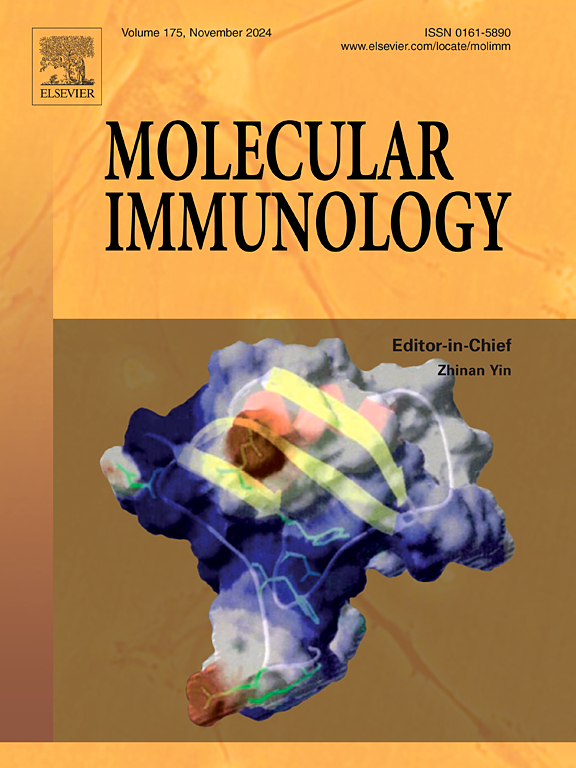神经素特异性抗体阻断treg介导的抗肿瘤免疫抑制,增强抗pd1的应答
IF 3.2
3区 医学
Q2 BIOCHEMISTRY & MOLECULAR BIOLOGY
引用次数: 0
摘要
调节性T细胞(Tregs)和效应T细胞在肿瘤免疫中发挥关键作用,Tregs抑制免疫反应并促进免疫抑制肿瘤微环境(TME)。神经素-1 (neurtin -1, Nrn)是一种神经肽,可以促进Treg的扩张。然而,其在T细胞生物学和肿瘤发展中的作用尚不清楚。我们发现Nrn在体外诱导的treg (iTregs)中高度表达。在功能上,Nrn以剂量依赖的方式促进iTreg分化,而Nrn缺失或抗Nrn抗体处理显著抑制iTreg分化。此外,Nrn抑制IL-2在T细胞中的转录和分泌,损害T细胞的活化和促炎细胞因子的产生。Treg特异性Nrn敲除小鼠显示B16黑色素瘤肿瘤生长减少,Treg浸润减少,效应T细胞浸润增加。相反,Nrn的过表达通过增强treg介导的抑制来加速B16黑色素瘤的肿瘤进展。重要的是,我们开发了第一个抗nrn抗体,有效地减少肿瘤生长,减少Treg浸润,增强效应t细胞活性。重要的是,抗nrn与抗pd1协同作用,通过降低肿瘤浸润T细胞中的Tregs和增加效应功能来改善抗pd1反应,从而增强肿瘤消退。我们的研究结果表明,Nrn是Treg分化和效应T细胞抑制的关键调节因子,有助于肿瘤的进展。单独靶向Nrn或联合抗pd1治疗是一种很有前途的增强抗肿瘤免疫的策略。本文章由计算机程序翻译,如有差异,请以英文原文为准。
Neuritin-specific antibody impedes the Treg-mediated suppression of anti-tumor immunity and enhances response to anti-PD1
Regulatory T cells (Tregs) and effector T cells play critical roles in tumor immunity, with Tregs suppressing immune responses and contributing to an immunosuppressive tumor microenvironment (TME). Neuritin-1 (Nrn), a neuropeptide, has been identified to enhance Treg expansion. However, its role in T cell biology and tumor development remains unclear. We demonstrated that Nrn is highly expressed in the in-vitro-induced Tregs (iTregs). Functionally, Nrn promoted iTreg differentiation in a dose-dependent manner, while Nrn deletion or anti-Nrn antibody treatment significantly inhibited iTreg differentiation. Additionally, Nrn suppressed IL-2 transcription and secretion in T cells, impairing T cell activation and pro-inflammatory cytokine production. Treg-specific Nrn knockout mice exhibited reduced B16 melanoma tumor growth, decreased Treg infiltration, and increased effector T cell infiltration. Conversely, overexpression of Nrn accelerated B16 melanoma tumor progression by enhancing Treg-mediated suppression. Importantly, we developed the first anti-Nrn antibody, which effectively reduced tumour growth, decreased Treg infiltration, and enhanced effector T-cell activity. Importantly, anti-Nrn synergistically worked with anti-PD1 and improved the anti-PD1 response by reducing Tregs and increasing effector function in tumor-infiltrated T cells, resulting in enhanced tumor regression. Our findings identify Nrn as a critical regulator of Treg differentiation and effector T cell suppression, contributing to tumor progression. Targeting Nrn alone or combined with anti-PD1 therapy represents a promising strategy to enhance anti-tumor immunity.
求助全文
通过发布文献求助,成功后即可免费获取论文全文。
去求助
来源期刊

Molecular immunology
医学-免疫学
CiteScore
6.90
自引率
2.80%
发文量
324
审稿时长
50 days
期刊介绍:
Molecular Immunology publishes original articles, reviews and commentaries on all areas of immunology, with a particular focus on description of cellular, biochemical or genetic mechanisms underlying immunological phenomena. Studies on all model organisms, from invertebrates to humans, are suitable. Examples include, but are not restricted to:
Infection, autoimmunity, transplantation, immunodeficiencies, inflammation and tumor immunology
Mechanisms of induction, regulation and termination of innate and adaptive immunity
Intercellular communication, cooperation and regulation
Intracellular mechanisms of immunity (endocytosis, protein trafficking, pathogen recognition, antigen presentation, etc)
Mechanisms of action of the cells and molecules of the immune system
Structural analysis
Development of the immune system
Comparative immunology and evolution of the immune system
"Omics" studies and bioinformatics
Vaccines, biotechnology and therapeutic manipulation of the immune system (therapeutic antibodies, cytokines, cellular therapies, etc)
Technical developments.
 求助内容:
求助内容: 应助结果提醒方式:
应助结果提醒方式:


